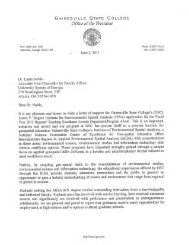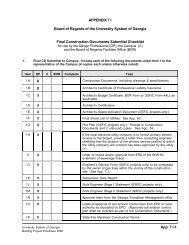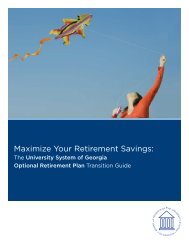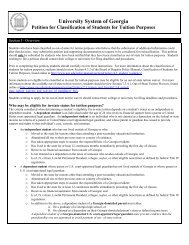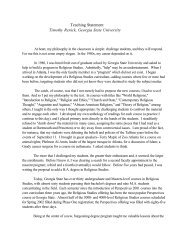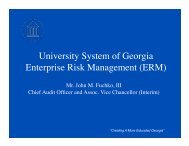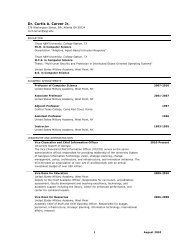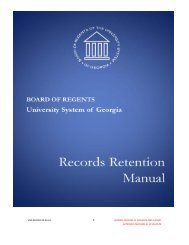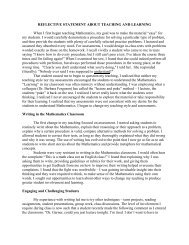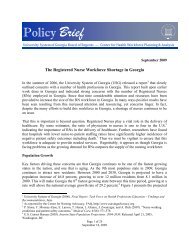WReier-Aviles on DSKGBLS3C1PROD with RULES266870 Federal Register / Vol. 75, No. 209 / Friday, October 29, 2010 / Rules and Regulationsinstitutions agree to accept credits whenstudents transfer from one institution toanother, or to cases where individualstudents transfer to a differentinstitution to complete their educationalprograms. Students who enroll in aninstitution and have college creditsaccepted on transfer that were earnedwhile in high school also do not comewithin the scope <strong>of</strong> this regulation.Changes: None.Comment: A number <strong>of</strong> commentersdisagreed with proposed § 668.5(a)(2),which has the effect <strong>of</strong> limiting therelative portions <strong>of</strong> an educationalprogram provided by more than oneinstitution under the same ownership orcontrol. Some commenters argued thatthe limit is arbitrary and inappropriatebecause—for all intents and purposes—institutions under common ownershipare the same. A few commenterssuggested that the regulations shouldfocus more narrowly on the institutionswith problems as opposed to allinstitutions under common ownership.Some commenters were unclear aboutwhat constitutes ‘‘common ownership’’and what types <strong>of</strong> written arrangementsare subject to the 50 percent limitationin § 668.5(a)(2)(ii).Some commenters indicated that theproposed regulations should apply to allinstitutions and not apply only to forpr<strong>of</strong>itinstitutions. Several commentersexpressed concern about theapplicability <strong>of</strong> this provision to themany written arrangements betweenpublic institutions within a State andwhether a State is considered to ‘‘own’’all <strong>of</strong> its institutions. Other commentersasked the <strong>Department</strong> to clarify thatpublic and private nonpr<strong>of</strong>it institutionsare not covered by the proposedlanguage in § 668.5(a)(2).In addition, commenters raisedconcerns about the potential impactthese regulations could have onstudents who move to another area andwant to transfer to another location <strong>of</strong>the same institution. One commenterstated that the proposed change woulddiscourage students who finish aprogram from transferring to anotherinstitution under the same control for ahigher level program.Some commenters objected to the<strong>Department</strong>’s assertions in the preamble<strong>of</strong> the NPRM that written arrangementsare used by institutions under commonownership to circumvent otherregulations and argued that the<strong>Department</strong> provided only anecdotalevidence to support the proposedchanges in § 668.5. Commenters statedthat institutions that are circumventingthe current regulations will find otheropportunities to do so and should facesanctions under the misrepresentationprovisions.Discussion: As indicated in thepreamble to the NPRM, the <strong>Department</strong>focused its regulatory changes on thetypes <strong>of</strong> institutions and situationswhere problems have been identifiedrather than expanding a requirement foraccrediting agencies to review writtenarrangements between institutionsunder common ownership. We modeledthese regulations on the language in§ 668.5(c)(3)(ii)(B), regarding writtenarrangements between an eligibleinstitution and an ineligible institutionor organization because that section <strong>of</strong>the regulations refers to institutions thatare owned or controlled by the sameindividual, partnership, or corporation.We do not agree with the commenterwho stated that the regulations arearbitrary and inappropriate becauseinstitutions under common ownershipare the same entity. This is becauseinstitutions are approved to participatein the Federal student aid programs asseparate entities, and they mustindividually demonstrate eligibility asan institution, eligibility for theprograms they <strong>of</strong>fer, programcompliance, cohort default rates,financial responsibility, andadministrative capability. Somelimitations on institutions that are basedon program measures can becircumvented if programs that appear tobe <strong>of</strong>fered by one institution are actually<strong>of</strong>fered by another institution. Theprohibition in this regulation willensure that the institution providingmost <strong>of</strong> the program will be the oneassociated with the students that aretaking the program.Section 668.5(a)(2) does not apply topublic or private nonpr<strong>of</strong>it institutionsbecause these institutions are not ownedor controlled by other entities andgenerally act autonomously. Somenonpr<strong>of</strong>it institutions may havebusiness relationships throughmanagement agreements or serviceagreements where similar concernscould arise, but those instances areexpected to be infrequent and will beaddressed on a case-by-case basis.These provisions do not impact theability <strong>of</strong> individual students to transferto another location <strong>of</strong> the sameinstitution or to another institutionunder the same ownership or controleither to complete an educationalprogram or to enroll in a higher-levelprogram. When a student transfers to anew institution and enrolls for thepurpose <strong>of</strong> completing a degree orcertificate, the new institution becomesthe degree-granting institution.We agree that institutions thatcircumvent or otherwise violateVerDate Mar2010 14:10 Oct 28, 2010 Jkt 223001 PO 00000 Frm 00040 Fmt 4701 Sfmt 4700 E:\FR\FM\29OCR2.SGM 29OCR2regulations should face appropriatesanctions.Changes: None.Comment: A number <strong>of</strong> commenterssupported the proposed changes to§ 668.5 regarding the limitations on theportion <strong>of</strong> the educational program thatmay be <strong>of</strong>fered by another institutionunder a written arrangement, but soughtclarification on how to measure portions<strong>of</strong> educational programs for thesepurposes. These commenters suggestedthat, for the purposes <strong>of</strong> determining thepercentage <strong>of</strong> the educational programprovided by each institution, we shouldtrack the provision <strong>of</strong> educationalservices on a programmatic basis ratherthan by the amount <strong>of</strong> coursework anindividual student may elect to take.Discussion: For purposes <strong>of</strong>determining the portions <strong>of</strong> theeducational program provided by eachinstitution under any writtenarrangement under § 668.5, the degreegrantinginstitution is responsible forlimiting the amount <strong>of</strong> the program thatmay be taken from any other institution.Because an institution cannot <strong>of</strong>fermore than 50 percent <strong>of</strong> an educationalprogram through another institution thatis under common ownership or control,if an institution <strong>of</strong>fered an educationalprogram on campus and online (througha written arrangement with anotherinstitution under common ownership)and <strong>of</strong>fered students the option <strong>of</strong> takingcourses by either method, the institutionmust ensure that each studentcompletes more than 50 percent <strong>of</strong> theeducational program on campus. If thesame institution enrolled students wholive beyond a reasonable commutingdistance to the campus and, therefore,take the online portion <strong>of</strong> the programfirst, the institution must be able todemonstrate that the students intend toattend on campus to complete at least50 percent <strong>of</strong> their educational program.Changes: None.Comment: Some commenters agreedthat the institution that grants thedegree or certificate should providemore than 50 percent <strong>of</strong> the educationalprogram, but suggested that monitoringfor compliance with this regulatoryprovision should be done by accreditingagencies rather than the <strong>Department</strong>.These commenters noted that to theextent that written arrangements arepart <strong>of</strong> a deliberative process related tothe development <strong>of</strong> curriculum andacademic requirements, they are part <strong>of</strong>a decision-making process bestperformed by an institution’s facultyand leadership and best evaluated byaccrediting agencies. Some commentersstated that the <strong>Department</strong> should relyon accrediting agencies to setappropriate limits on the portion <strong>of</strong> an
Federal Register / Vol. 75, No. 209 / Friday, October 29, 2010 / Rules and Regulations66871WReier-Aviles on DSKGBLS3C1PROD with RULES2educational program that can beprovided by the non-degree-grantinginstitution. One commenter stated that,currently, some national accreditingagencies allow students the opportunityto take more than 50 percent <strong>of</strong> theireducational program from the nondegree-grantinginstitution.Discussion: We acknowledge theimportant role that an institution’sfaculty and leadership play in thedevelopment <strong>of</strong> written arrangements aswell as the role <strong>of</strong> accrediting agenciesin monitoring the use <strong>of</strong> sucharrangements in accordance with theirstandards. However, as we learnedduring negotiations, accreditingagencies have differing practicesconcerning the review <strong>of</strong> writtenarrangements, and some accreditingagencies do not routinely review writtenarrangements. As such, we believe thatit is important to establish a thresholdfor the amount <strong>of</strong> the educationalprogram that can be <strong>of</strong>fered under awritten arrangement by an institutionunder common ownership with a hostinstitution. Accrediting agencies mayestablish a more restrictive measure ifthey wish to do so.Changes: None.Comment: One commenter expressedconcern that proposed § 668.5(a) wouldaffect the Service Members OpportunityCollege Army Degree (SOCAD)Institution Agreements currently inplace, which allow 75 percent <strong>of</strong> aneducational program to be provided bythe non-degree-granting institution.However, the Contract Administrator <strong>of</strong>SOCAD provided a separate commentstating that the proposed regulationswould not affect the currentrelationships provided to members <strong>of</strong>the military.Discussion: As noted earlier, theproposed limitations in § 668.5(a)(2)apply only to written arrangementsbetween two or more eligibleinstitutions that are owned or controlledby the same individual, partnership, orcorporation. To the extent that theeligible institutions that participate inSOCAD are not owned or controlled bythe same individual, partnership, orcorporation, they are not subject to theproposed changes in § 668.5(a)(2).Changes: None.Comment: One commenter supportedthe clarification that the enrollinginstitution has all the necessaryapprovals to <strong>of</strong>fer an educationalprogram in the format in which it isbeing provided. Another commenterargued that it is nonsensical to requirethe enrolling institution to have all thesame approvals as the providinginstitution. The commenter stated thatwritten arrangements exist to permitflexibility for students and additionaloptions for students in pursuing theireducation goals. One <strong>of</strong> the benefits <strong>of</strong>such arrangements, argued thecommenter, is to provide student accessto learning resources and opportunitiesthat the degree-granting institutioncannot provide. For example, writtenarrangements may afford studentsaccess to online learning from aninstitution with demonstratedcompetencies in providing distanceeducation. Our clarification in thepreamble to the NPRM that theinstitution enrolling the student musthave the approval to <strong>of</strong>fer an educationprogram in the format in which it isbeing <strong>of</strong>fered limits the ability forcampus-based schools to <strong>of</strong>fer cuttingedgeonline delivery methods for someprograms even when these onlinecourses are provided by affiliated andfully accredited institutions. Onecommenter argued that the <strong>Department</strong>had failed to provide data to supportthis limitation. Another commentersuggested that there should be atransition or grace period to allowinstitutions to get any needed approvals.Discussion: We agree that writtenarrangements are designed to provideeducational flexibility for students andto allow them access to resources andopportunities that may not be availablefrom their degree-granting institution.However, we believe that it is importantthat the degree-granting institution haveall the necessary approvals to <strong>of</strong>fer theeducational program in the format inwhich it is being <strong>of</strong>fered. We note thatonly in cases in which an institution is<strong>of</strong>fering more than 50 percent <strong>of</strong> aneducational program through distanceeducation is the institution required toreceive approval from its accreditingagency to <strong>of</strong>fer distance education.Therefore, a student who is taking onlya few courses online as part <strong>of</strong> a writtenarrangement would not be likely totrigger the requirement that aninstitution seek approval from itsaccrediting agency to <strong>of</strong>fer distanceeducation. We do not see a need for atransition or grace period to allowinstitutions to get any needed approvalsbecause we believe that mostinstitutions already have the necessaryapprovals in place.Changes: None.Requirements for ArrangementsBetween Eligible Institutions andIneligible Institutions or Organizations(§ 668.5(c))Comment: One commenter supportedthe expansion <strong>of</strong> the list <strong>of</strong> conditionsthat preclude an arrangement betweenan eligible institution and an ineligibleentity reflected in proposed § 668.5(c).VerDate Mar2010 14:10 Oct 28, 2010 Jkt 223001 PO 00000 Frm 00041 Fmt 4701 Sfmt 4700 E:\FR\FM\29OCR2.SGM 29OCR2Another commenter stated that the list<strong>of</strong> exclusions in proposed § 668.5(c) isoverly broad. This commenter agreedwith the <strong>Department</strong>’s intent butpointed out that denial <strong>of</strong> recertification(§ 668.5(c)(iv)) may be due to a factorsuch as program length. The commentersuggested that we narrow § 668.5(c)(iv)to cover only denials <strong>of</strong> recertificationthat are based on the institution’s lack<strong>of</strong> administrative capability or financialresponsibility.Discussion: We appreciate the supportfor the expansion <strong>of</strong> the list <strong>of</strong>conditions that preclude an arrangementbetween an eligible institution and anineligible entity reflected in § 668.5(c).We disagree with the commenter whorecommended that we limit the denial<strong>of</strong> recertification condition to cover onlythose recertification denials that arebased on the institution’s lack <strong>of</strong>administrative capability or financialresponsibility. An institution that has itsrecertification denied because it doesnot <strong>of</strong>fer one or more programs <strong>of</strong>sufficient length to qualify to participatein the Title IV, HEA programs hascommitted a serious programmaticviolation that the <strong>Department</strong> believesshould be included in this prohibition.Changes: None.Disclosures to Students (§§ 668.5(e) and668.43(a)(12))Comment: Several commenterssupported the requirement thatinstitutions providing an educationalprogram under § 668.5(a), (b), or (c)inform students when part <strong>of</strong> theireducational program is provided by adifferent institution and <strong>of</strong> additionalcharges that the student may incurwhen enrolling in an educationalprogram that is provided in part byanother institution. They noted that allcommunication to students should beclear, user-friendly, and understandable.One commenter suggested that werevise § 668.43(a)(12)(ii) to require theinstitution to include in its description<strong>of</strong> its written arrangements the Websites along with the names and locations<strong>of</strong> the other institutions or organizationsthat are providing the portion <strong>of</strong> theeducational program that the degree- orcertificate-granting institution is notproviding. Another commenter askedwhether § 668.43(a)(12)(iv) requires theinstitution to include in its description<strong>of</strong> its written arrangements an estimate<strong>of</strong> the costs incurred by students takingonline courses (e.g., the costs <strong>of</strong>purchasing a computer and obtainingInternet access).A few commenters requestedclarification on whether the requiredstudent notifications apply only toeducational programs that require
- Page 1 and 2: Friday,October 29, 2010Part IIDepar
- Page 3 and 4: Federal Register / Vol. 75, No. 209
- Page 6 and 7: 66836 Federal Register / Vol. 75, N
- Page 8 and 9: 66838 Federal Register / Vol. 75, N
- Page 10 and 11: WReier-Aviles on DSKGBLS3C1PROD wit
- Page 12 and 13: 66842 Federal Register / Vol. 75, N
- Page 14 and 15: 66844 Federal Register / Vol. 75, N
- Page 16 and 17: WReier-Aviles on DSKGBLS3C1PROD wit
- Page 18 and 19: 66848 Federal Register / Vol. 75, N
- Page 20 and 21: 66850 Federal Register / Vol. 75, N
- Page 22 and 23: WReier-Aviles on DSKGBLS3C1PROD wit
- Page 24 and 25: 66854 Federal Register / Vol. 75, N
- Page 26 and 27: WReier-Aviles on DSKGBLS3C1PROD wit
- Page 28 and 29: 66858 Federal Register / Vol. 75, N
- Page 30 and 31: 66860 Federal Register / Vol. 75, N
- Page 32 and 33: 66862 Federal Register / Vol. 75, N
- Page 34 and 35: 66864 Federal Register / Vol. 75, N
- Page 36 and 37: 66866 Federal Register / Vol. 75, N
- Page 38 and 39: WReier-Aviles on DSKGBLS3C1PROD wit
- Page 42 and 43: 66872 Federal Register / Vol. 75, N
- Page 44 and 45: WReier-Aviles on DSKGBLS3C1PROD wit
- Page 46 and 47: WReier-Aviles on DSKGBLS3C1PROD wit
- Page 48 and 49: WReier-Aviles on DSKGBLS3C1PROD wit
- Page 50 and 51: 66880 Federal Register / Vol. 75, N
- Page 52 and 53: WReier-Aviles on DSKGBLS3C1PROD wit
- Page 54 and 55: 66884 Federal Register / Vol. 75, N
- Page 56 and 57: 66886 Federal Register / Vol. 75, N
- Page 58 and 59: WReier-Aviles on DSKGBLS3C1PROD wit
- Page 60 and 61: WReier-Aviles on DSKGBLS3C1PROD wit
- Page 62 and 63: WReier-Aviles on DSKGBLS3C1PROD wit
- Page 64 and 65: WReier-Aviles on DSKGBLS3C1PROD wit
- Page 66 and 67: WReier-Aviles on DSKGBLS3C1PROD wit
- Page 68 and 69: WReier-Aviles on DSKGBLS3C1PROD wit
- Page 70 and 71: WReier-Aviles on DSKGBLS3C1PROD wit
- Page 72 and 73: 66902 Federal Register / Vol. 75, N
- Page 74 and 75: WReier-Aviles on DSKGBLS3C1PROD wit
- Page 76 and 77: WReier-Aviles on DSKGBLS3C1PROD wit
- Page 78 and 79: 66908 Federal Register / Vol. 75, N
- Page 80 and 81: WReier-Aviles on DSKGBLS3C1PROD wit
- Page 82 and 83: 66912 Federal Register / Vol. 75, N
- Page 84 and 85: WReier-Aviles on DSKGBLS3C1PROD wit
- Page 86 and 87: 66916 Federal Register / Vol. 75, N
- Page 88 and 89: WReier-Aviles on DSKGBLS3C1PROD wit
- Page 90 and 91:
WReier-Aviles on DSKGBLS3C1PROD wit
- Page 92 and 93:
WReier-Aviles on DSKGBLS3C1PROD wit
- Page 94 and 95:
66924 Federal Register / Vol. 75, N
- Page 96 and 97:
WReier-Aviles on DSKGBLS3C1PROD wit
- Page 98 and 99:
66928 Federal Register / Vol. 75, N
- Page 100 and 101:
WReier-Aviles on DSKGBLS3C1PROD wit
- Page 102 and 103:
66932 Federal Register / Vol. 75, N
- Page 104 and 105:
WReier-Aviles on DSKGBLS3C1PROD wit
- Page 106 and 107:
66936 Federal Register / Vol. 75, N
- Page 108 and 109:
66938 Federal Register / Vol. 75, N
- Page 110 and 111:
66940 Federal Register / Vol. 75, N
- Page 112 and 113:
66942 Federal Register / Vol. 75, N
- Page 114 and 115:
66944 Federal Register / Vol. 75, N
- Page 116 and 117:
66946 Federal Register / Vol. 75, N
- Page 118 and 119:
WReier-Aviles on DSKGBLS3C1PROD wit
- Page 120 and 121:
WReier-Aviles on DSKGBLS3C1PROD wit
- Page 122 and 123:
WReier-Aviles on DSKGBLS3C1PROD wit
- Page 124 and 125:
66954 Federal Register / Vol. 75, N
- Page 126 and 127:
WReier-Aviles on DSKGBLS3C1PROD wit
- Page 128 and 129:
66958 Federal Register / Vol. 75, N
- Page 130 and 131:
66960 Federal Register / Vol. 75, N
- Page 132 and 133:
WReier-Aviles on DSKGBLS3C1PROD wit
- Page 134 and 135:
WReier-Aviles on DSKGBLS3C1PROD wit
- Page 136 and 137:
WReier-Aviles on DSKGBLS3C1PROD wit
- Page 138 and 139:
66968 Federal Register / Vol. 75, N
- Page 140 and 141:
66970 Federal Register / Vol. 75, N
- Page 142 and 143:
66972 Federal Register / Vol. 75, N
- Page 144 and 145:
66974 Federal Register / Vol. 75, N



